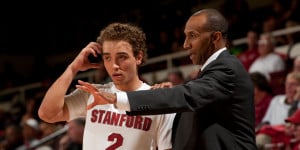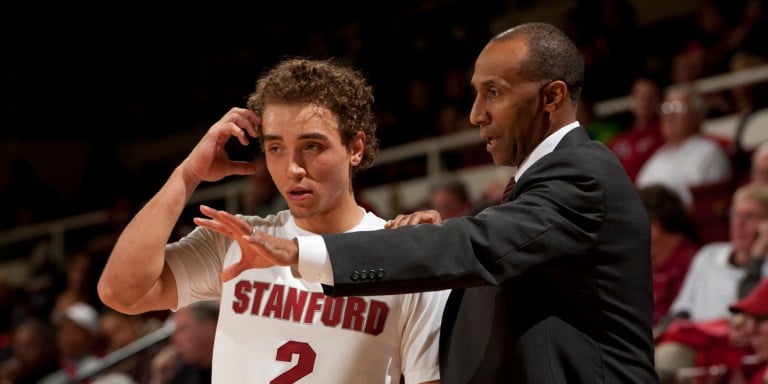Preparation for a rivalry game always includes a little more pomp and circumstance than a normal week does. From extended practices to pep rallies and other traditions, rivalry weeks can be a chaotic and eventful time for players and coaches alike.

As the Stanford men’s basketball team prepared to play California last weekend, however, head coach Johnny Dawkins had something a little different in mind for his team.
“My best friend and a former teammate of mine from Duke University came [to talk us] this week. A guy by the name of David Henderson,” Dawkins revealed to the media after the crucial win was secured.
Henderson, a co-captain with Dawkins of the 1986 Duke team that made it to the NCAA Tournament championship game, joined two other speakers to tell Stanford to seize the moment and give their everything at this pivotal point in the season. With just a few games remaining before the NCAA tournament and Stanford firmly positioned on the bubble, the message was clear that the Cardinal couldn’t afford many more sluggish performances.
“The thrust of all their talks was to go out there and just lay it all on the line,” Dawkins described. “Don’t go out there and try to work your way into it, go out there right away and get after it… it’s about going out there and competing all the way.”
After having looked a little stale in the previous few games, Stanford finally managed to come out screaming against Cal. The teams traded barbs for the first few minutes, but Stanford slowly built a lead that Cal couldn’t overcome.
Freshman Michael Humphrey was almost inhuman as he earned his first collegiate double-double, and Stanford was able to shoot and move the ball around in a much more efficient fashion than they had in their previous games.
“I thought our guys took [the messages] to heart,” Dawkins said.
Dawkins is known for his poise and class when dealing with basketball matters, traits that aren’t always conducive to serving as a source of motivation for an often-inconsistent basketball team. Stanford’s seventh-year head coach has not neglected this area, however, often outsourcing key motivational speeches to his prominent connections.
The most notable such outside performance in recent memory occurred when linebacker Ray Lewis, a former star for the Baltimore Ravens, delivered an energetic speech to the team before the first game of its 2012 NIT Championship. Lewis’ speech attracted national media attention for its excited (if slightly confusing) message.
Dawkins reiterated, however, that these particular guests provided a chance for internal reflection as much as they boosted external motivation. With many graduating seniors likely to have their careers at Stanford defined by the team’s performance in the final few matchups this season, a message like this came at quite an opportune time and likely did not fall on deaf ears.
“[The game] was more so just about our standards and what we want to do for the rest of this year. NCAA or not, we just want to go out the right way.”
Contact Andrew Mather at amather ‘at’ stanford.edu.
